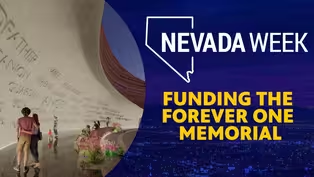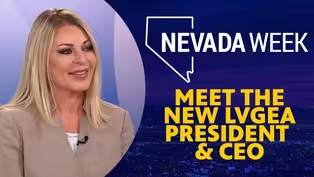
UNLV Rebels Head Coach on Name, Image, and Likeness for college athletes
Clip: Season 8 Episode 13 | 6m 31sVideo has Closed Captions
UNLV Rebels Head Coach Dan Mullen shares his take on Name, Image, and Likeness policies.
UNLV Rebels Head Coach Dan Mullen shares his take on how Name, Image, and Likeness policies impact the student athletes he’s worked with.
Problems playing video? | Closed Captioning Feedback
Problems playing video? | Closed Captioning Feedback
Nevada Week is a local public television program presented by Vegas PBS

UNLV Rebels Head Coach on Name, Image, and Likeness for college athletes
Clip: Season 8 Episode 13 | 6m 31sVideo has Closed Captions
UNLV Rebels Head Coach Dan Mullen shares his take on how Name, Image, and Likeness policies impact the student athletes he’s worked with.
Problems playing video? | Closed Captioning Feedback
How to Watch Nevada Week
Nevada Week is available to stream on pbs.org and the free PBS App, available on iPhone, Apple TV, Android TV, Android smartphones, Amazon Fire TV, Amazon Fire Tablet, Roku, Samsung Smart TV, and Vizio.
Providing Support for PBS.org
Learn Moreabout PBS online sponsorship-And while some say Southern Nevada relies too much on tourism, UNLV Head Football Coach Dan Mullen says, in recruiting, it helps him.
(Dan Mullen) There's a lot of great fun things.
Go to a UFC fight with a lot of guys on the team.
We-- We're, you know-- -You were at the boxing match.
-Yeah.
Canelo-Crawford, the fight.
The fight of the decade, or whatever it is, we're there.
There's restaurants, hiking, boat.
I mean, there's all of these things that a lot of other towns don't have.
-Mullen is in his first season at UNLV.
Before this, he last coached in 2021.
That's when the University of Florida fired him after a 5-6 season.
A former SEC Coach of the Year, he won more than 100 games as head coach at Florida and Mississippi State, but returns to what he calls a new college football world where athletes can more easily transfer to other schools and where schools can now pay their players for use of their name, image, and likeness.
We spoke with him about how he's adjusting.
-The coaching part of Florida didn't end the way I wanted to.
That wasn't my final chapter of coaching.
Reflecting on what happened there, probably the end was very different than a lot of people would think.
And then you get to rationalize that, and you really find, okay, college football's changed.
How can I be better?
And to be honest with you, that's one of the things that really excited me here.
It's brought a lot of joy back to the coaching part of my life being here.
And I really enjoy it, you know?
I really enjoy it here.
-And you choose to return when it's completely different.
I mean, the name, image, and likeness money, the transfer portal.
-It's a very different game, very different game.
-I mean, when you are recruiting players, are you literally telling them how much money you might be able to get them in a deal?
-Well, I don't, but our GM does.
I tell them, this is how we'll develop you.
But I share with a lot of players.
And it is a shame.
It's still about development.
The game is still about development.
I sat with a young guy we have on our team.
I remember he said, Coach, this would be my third school in three years.
And I said, well, here's a great deal for you.
If you are worried about how much you play, how much you touch the ball, how many tackles, whatever your stats, if that's all you're worried about, next year you'll be at your fourth school in four years; and the year after, you'll go home and you will have gotten nothing out of this experience.
If you worry about your development, if every day you just worry about getting better, all the things the other things you're worried about will take care of themselves.
And so you're still in this developmental game.
The key is making sure you understand how to implement the new world of transfer portal and NIL into the development game and making sure the players still understand it's still about your development.
And as soon as you're worried about anything but getting better every day, the result's gonna go the opposite direction than what you think it is.
-And it seems like what your strategy has been, that you've talked about, is take it one year at a time.
How do you develop a player with just one?
-It's tricky.
You have to think about it and build a team together.
It's really a one to two year.
-Okay.
-It's really one.
And you can have a little bit of an idea within the program.
Used to be a program, you're looking four to five years.
Back when we were the number one team in the country at Mississippi State, you could see this group of guys coming up and say, these guys have something about them that are pretty special.
Well, in today's world, they wouldn't have all been there.
They would have transferred or wouldn't have been able to keep them all or something would have happened.
So you could see like, hey, two years out, this group could be special coming up.
In today's world, you're looking-- We put this team, I mean, it's a whole new team.
We came back with two returning starters on the whole roster.
You got to build from there.
But you understand that being out and coming back in.
You get into the picture of things of let's focus on it's all about this year, and maybe we'll look a little bit ahead to next year with the program in a two-year window.
But definitely not beyond that.
So I was able to get that while I was away.
I talked to a lot of coaches, and you could see the old school coaches really struggle with the new world of what it was.
I could promise you this: If I had stayed in coaching, I don't know that I would still be going.
I think you look like a Nick Saban, and you look at a lot of the guys that are walking away and just because they were living the change on a day-to-day basis.
I looked at the new world and said, okay, I'm going to change this way when I come back.
And if I change that way, then I can handle the new world of college football, because I have to give up a lot of things that I used to do and beliefs I used to have.
And as long as you can accept that, you know, I'm still the same person out on the field, but how you run the program is different.
-Have you seen that it changes how players operate or compose themselves, or-- -A lot.
You know, listen, there's added pressures.
There's added pressures on the kids.
-Because of NIL?
-You know, they're looking, the family members of, Hey, we can make money off of you now.
You know?
And, Boy, are you getting the most you can get?
And again, you know what they're not saying?
Are you getting your degree?
Are you getting better every day?
Is this building a foundation for you 15 years down the road?
And so you have to kind of guide them through that part of life.
You know that part of the 2014 Mississippi State team that came back, all of those guys are like, Coach, every life lesson you gave applied to me in this business I opened, and I'm really successful.
Applied to this job.
I'm out in the backyard yelling at my son the same thing you yelled at me, and I get it now.
I didn't get it when I played for you, but I get it now.
And as a parent and as a husband, I get the things that it was you were teaching us way more than the game of football.
Well, when a lot of the worries go away from just their development within a program, you can tend to lose that, and you hope not to.
And we still try to hammer that point home.
-At the time of that interview, UNLV was 4-0, and already Coach Mullen was being talked about as a coaching candidate at other universities.
He told Nevada Week that he's happy here.
He loves Las Vegas and that he doesn't think there's anywhere else for him to go.
Funding the Forever One Memorial
Video has Closed Captions
Clip: S8 Ep13 | 10m 3s | Vegas Strong Treasurer Kelly McMahill shares the fundraising efforts for the Forever One Memorial. (10m 3s)
Meet the new LVGEA President & CEO
Video has Closed Captions
Clip: S8 Ep13 | 8m 49s | Danielle Casey is the new President and CEO for Las Vegas Global Economic Alliance. (8m 49s)
Providing Support for PBS.org
Learn Moreabout PBS online sponsorship
- News and Public Affairs

Top journalists deliver compelling original analysis of the hour's headlines.

- News and Public Affairs

FRONTLINE is investigative journalism that questions, explains and changes our world.












Support for PBS provided by:
Nevada Week is a local public television program presented by Vegas PBS

